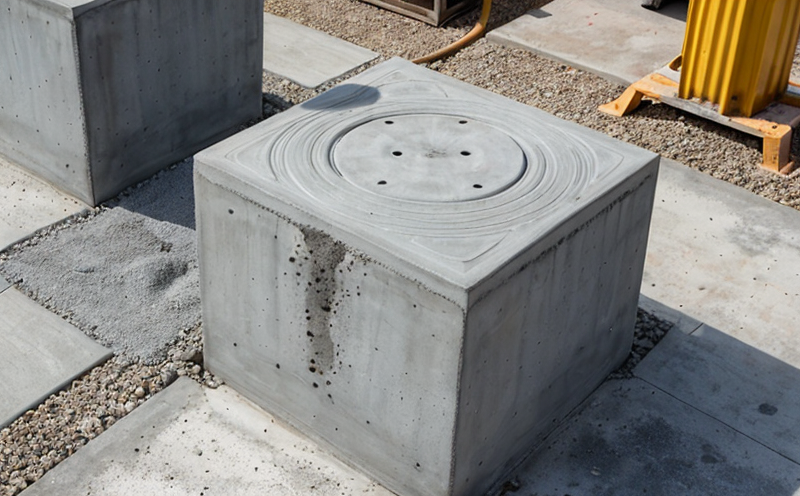EN 197 – Cement Composition and Performance Testing
The European Standard EN 197-3 specifies the methods for determining the chemical composition of cement. This standard is crucial for ensuring that the cement meets the specified quality parameters set by international standards, thereby guaranteeing its suitability for various construction applications.
This service focuses on the detailed analysis and testing of cement composition to ensure compliance with EN 197-3 requirements. The tests are conducted using state-of-the-art equipment, which allows us to provide precise results that meet both national and international standards.
The process begins with sample preparation, where the raw materials used in cement production are analyzed. This includes limestone, clay, and other additives. Once prepared, a representative sample of the cement is taken for testing. The analysis involves several key parameters such as:
- Chemical composition
- Sulfur content
- Alkali content
- Loss on ignition (LOI)
- Fineness and stability
- Specific surface area measurement
- Setting time determination
- Compressive strength testing at various ages
The results of these tests are used to ensure that the cement meets the required specifications for use in construction projects. This service is particularly important for compliance with international standards, ensuring that the cement is fit for purpose and safe for use.
The analysis of cement composition is critical in ensuring that the product meets the desired performance characteristics. For instance, the chemical composition directly influences the setting time, which can impact the workability and placement of concrete during construction. The LOI test helps ensure that there are no volatile compounds that could potentially affect the stability and durability of the final structure.
The results from these tests are typically reported in a comprehensive quality assurance document. This document includes all the test results along with their interpretations, compliance statements, and recommendations for improvement if necessary. The report is designed to be easily understandable by both technical staff and non-specialists involved in construction projects.
By providing accurate and reliable data on cement composition, this service ensures that the materials used in building and infrastructure projects are of the highest quality. This not only enhances project performance but also contributes to sustainability goals by reducing waste and ensuring efficient use of resources.
Quality and Reliability Assurance
The reliability of the test results is paramount in the building and infrastructure testing industry. To ensure accuracy and consistency, we adhere strictly to international standards such as EN 197-3. This commitment to quality is further reinforced by our use of advanced analytical instruments that provide precise data.
- Advanced X-ray fluorescence spectrometers (XRF)
- Laser diffractometers
- Automatic compressive strength testers
- Gravimetric analysis equipment
- Thermogravimetric analyzers (TGA)
The use of these instruments ensures that the data we provide is accurate and reliable, which is essential for making informed decisions in construction projects. Regular calibration and maintenance of our equipment further enhance its reliability.
In addition to using state-of-the-art equipment, we employ highly skilled technicians who are trained to handle complex samples with precision. This expertise ensures that even the most challenging tests can be conducted accurately and efficiently.
Customer Impact and Satisfaction
The success of any construction project hinges on the quality of its materials. By ensuring that cement composition meets specified quality parameters, this service has a direct impact on customer satisfaction. Accurate testing not only enhances the performance of the final product but also ensures compliance with international standards.
Our commitment to quality and reliability is reflected in our high level of customer satisfaction. We regularly receive positive feedback from clients who rely on us for accurate and reliable data. This service helps them make informed decisions, reducing risks and improving overall project outcomes.
The use of advanced analytical instruments and skilled technicians ensures that we can provide precise results quickly, which is crucial in the fast-paced environment of construction projects. Our ability to meet tight deadlines while maintaining high standards has earned us a reputation for excellence in the industry.
Use Cases and Application Examples
The EN 197-3 standard plays a critical role in ensuring that cement meets specified quality parameters, which are essential for its suitability in various construction applications. Here are some real-world use cases where this service is particularly beneficial:
- Concrete Mixing Plants: Ensuring the consistency and quality of the cement used in mixing processes.
- Civil Engineering Projects: Guaranteeing that the cement meets required standards for large-scale infrastructure projects.
- High-Rise Construction: Providing precise data on cement composition to enhance the structural integrity of high-rise buildings.
- R&D and Innovation: Supporting research and development activities by providing accurate test results for new cement formulations.
In each case, the precision and reliability of our testing services are crucial in ensuring that the final product meets all necessary standards. This not only enhances project performance but also contributes to sustainability goals by reducing waste and ensuring efficient use of resources.





